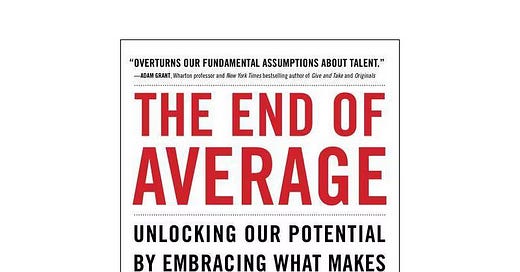Breaking free from 'average'
Why one-size-fits-all systems fail and how to unlock their true potential
The End of Average: Unlocking Our Potential by Embracing What Makes Us Different
By Todd Rose
"The hardest thing we will ever do is to abandon the notion that the average person is real."
In The End of Average, Todd Rose dismantles one of the most persistent myths in modern society: that the concept of average is a meaningful measure of human ability, intelligence, or potential. Rose argues that designing systems—whether in education, business, or hiring—around the so-called average person ignores individual uniqueness and ultimately leads to failure.
This book was one of my favorites from 2024, largely because of the sheer depth of research and data Rose presents. The most mind-blowing example? The story of how the U.S. Air Force discovered that not a single pilot actually fit the average body dimensions used to design cockpits.
The consequences were devastating—before the military realized their mistake, many pilots struggled to control their aircraft, leading to avoidable crashes and accidents.
The heartbreaking reality was that these highly skilled aviators faced unnecessary risks, not because of their abilities, but because of a flawed statistical model. Only after the Air Force shifted to adjustable cockpits did performance and safety dramatically improve, saving lives and changing aviation forever. That same principle applies to nearly every system built on averages, from schools to workplaces.
What's the big deal?
Rose’s core argument is that when we design for average, we fail everyone. The idea of the average student, average worker, or average consumer is a statistical illusion that leads to ineffective policies and decisions. Instead, he introduces the jaggedness principle—the idea that people vary across multiple dimensions, and trying to fit them into one-size-fits-all categories is a losing game.
Take education: For decades, schools have measured students using standardized tests and assumed a linear model of intelligence. But Rose shows that intelligence is multidimensional. Someone who struggles in one subject might excel in another, yet traditional schooling treats students as if they all learn the same way. This outdated approach stifles potential and rewards conformity over innovation.
Five key takeaways
There is no such thing as an average person. Every human is unique, with individual strengths and weaknesses that can't be captured by a single number or measure.
One-size-fits-all systems fail everyone. Whether in education, work, or health, designing around the average leads to inefficiencies, missed opportunities, and unnecessary struggles.
The jaggedness principle explains human variation. People don’t develop in straight lines. A person might be exceptional in one area and struggle in another, and that's normal.
Context matters more than raw ability. Success isn't just about talent; it's about how well an individual’s strengths align with their environment. The right fit makes all the difference.
Personalization is the future. From adaptive learning in education to individualized job training, tailoring experiences to fit real people—not averages—leads to better outcomes.
Why you should read the book
Rose’s book is a wake-up call for anyone who has ever been labeled as average or been told they don’t measure up. It challenges deeply ingrained assumptions and makes a compelling case for a world that recognizes individual potential instead of forcing people into ill-fitting molds.
If you’ve ever felt constrained by traditional systems—whether at school, work, or in life—this book will change how you see yourself and the world around you.




